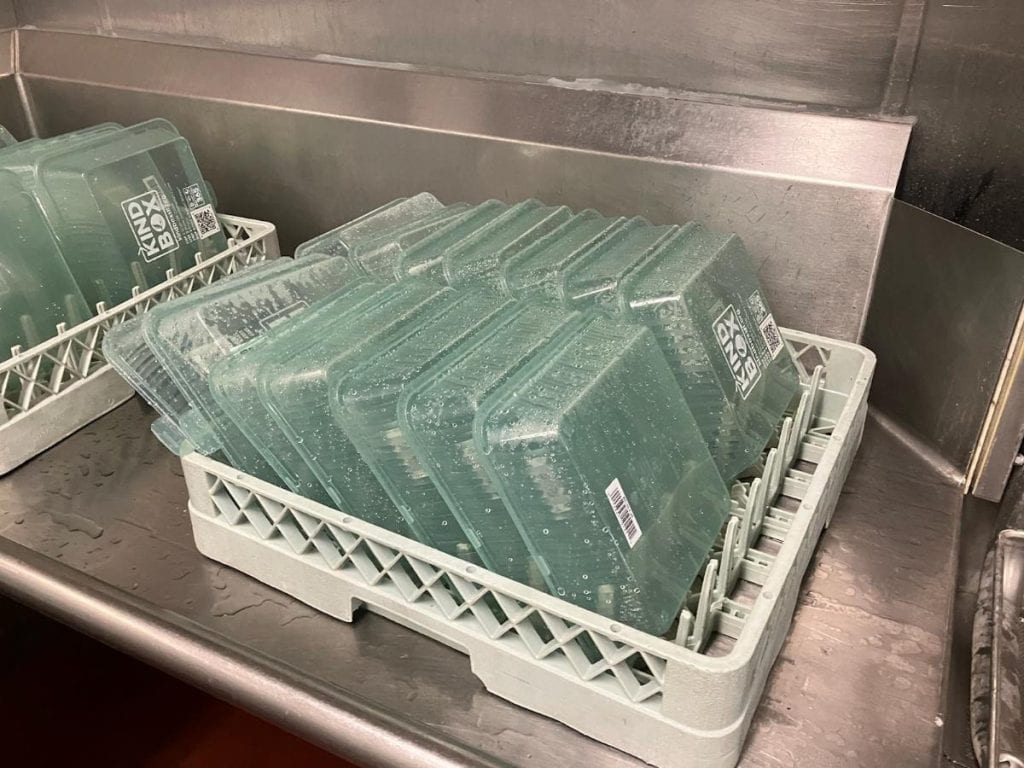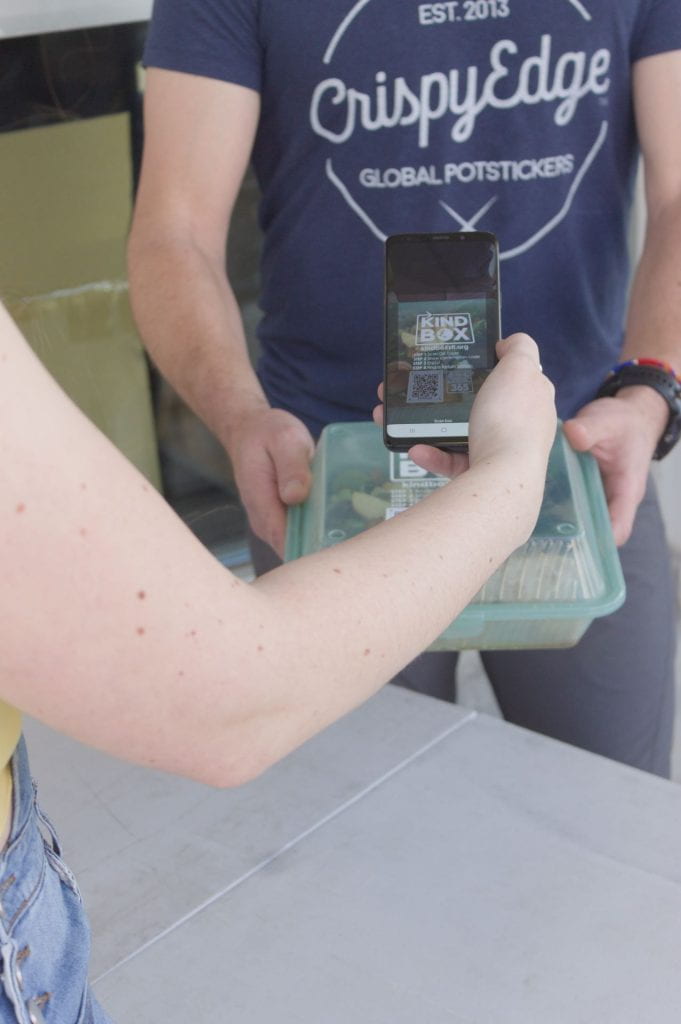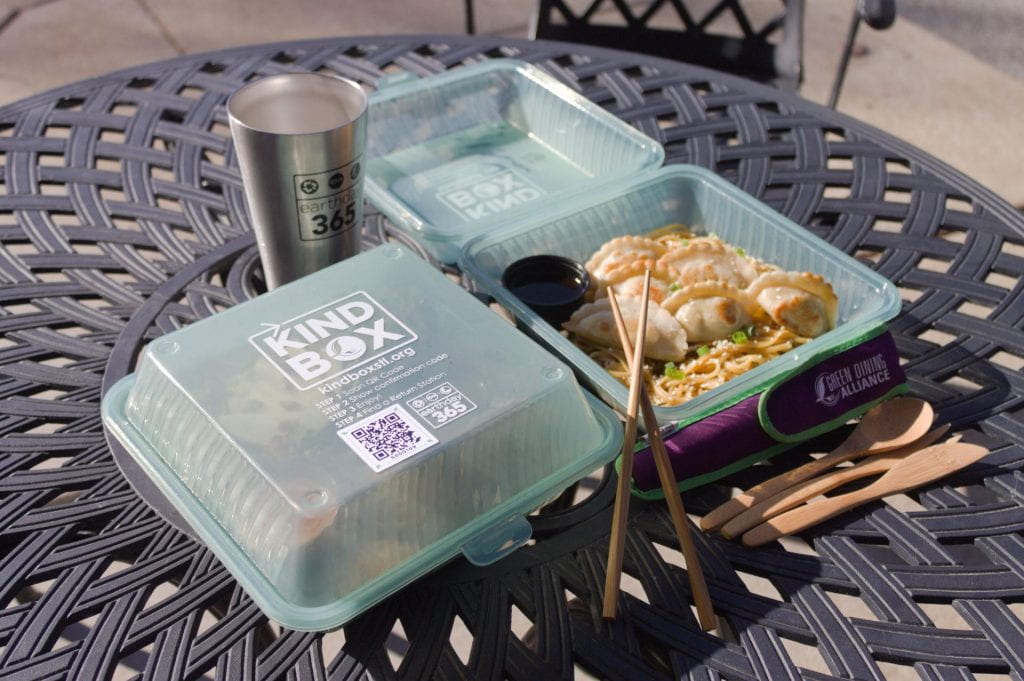Written by Communications Associate, Jarea Fang
Take-out meals are the best of both worlds, a heavenly combination of restaurant food and the comfort of your own home. The demand for take-out has especially increased since the onset of the COVID-19 pandemic, when physical distancing became the norm. Striking a balance between disease prevention and reducing plastic waste has been a hot button topic since then, leading many restaurants and organizations to invent or invest in reusable take-out containers.
While “reusable” and “take-out” might sound like opposite concepts, they don’t have to be. Here at WashU, they joined forces long ago. By taking advantage of WashU’s rentable Greenware Program and Eco2go containers, many members of our community have familiarized themselves with sustainable single-use foodware long before the COVID-19 pandemic. The Bauer Cafe’s recent transition to nearly 100% compostable products is yet another step that WashU has taken to reduce plastic waste in our dining experience, bringing us toward the Zero Waste goals outlined in the 2015 Strategic Plan for Sustainable Operations.
Outside of WashU, earthday365 is guiding the St. Louis region in a similar direction. Known for its annual St. Louis Earth Day Festival at Forest Park, Recycling on the Go program, and Green Dining Alliance, this reputable nonprofit is now taking a stab at introducing reusable take-out containers on a city-wide scale.
Introducing: Kind Box.
How it Started
Here at the Office of Sustainability, we once wrote a Resource Digest article on “The Story of Stuff,” a viral 2007 short film that illustrates the harmful nature of planned obsolescence. Planned obsolescence is an industry norm of building products to be artificially frail with the intention of maximizing profit by requiring frequent replacements. This practice, which has dominated American industries since the 20th century, has transformed our society’s purchasing habits. These days, it’s commonplace to opt for replacement instead of repair of the and upgrades instead of upkeep, while our earth bears the consequences as landfills continue to rise.
So, what’s the solution?
According to the US Environmental Protection Agency (EPA), sustainable materials management (SMM) is a systematic approach to using and reusing materials more productively over their entire life cycles. To Bob Henkel, program director at earthday365, this means better managing our waste and asking if there are better opportunities and solutions other than landfill.
“With the Kind Box program, we are upgrading from a recycling strategy to a circular economy, where material isn’t just recycled into something else but is actually reused until it can no longer be useful,” Bob explains. “Why should my to-go container last for hundreds of years in the landfill after one use, when the food inside only lasts for 15 minutes before I eat it?”

Like many reusable to-go flatware initiatives around the nation, Kind Box emerged after the first waves of the COVID-19 pandemic, even though the idea of popularizing reusable to-go containers circulated around earthday365 long before then. As the pandemic reduced workload for Recycling on The Go, which works with in-person events to raise the rates of recycling and composting, and the Green Dining Alliance, which certifies and engages St. Louis restaurants around sustainability, earthday365 saw an opportunity to address waste reduction following the rise of disposable restaurant waste. After researching WashU’s eco2go program and Durham, North Carolina’s Green To Go program, they partnered up with a developer in Seattle to build an app and website to run the first regional reuse container program in St. Louis.

“Although it is currently available on both the iOS App Store and the Android Play Store, the Kind Box app is in testing and development mode. Diners can still set up a free account to utilize a Kind Box for their pick-up to-go orders. They can then return the Kind Box to a drop box ‘return station’ located near the restaurant.” Bob explains. “Our staff frequently service the return stations, collect the containers, and wash and sanitize them at St. Patrick’s Center where the health department has certified our dishwashing process. We can then continue to supply member restaurants with more Kind Boxes as needed.”
While Kind Boxes are currently only available through the Green Dining Alliance restaurants Crispy Edge and The Royale, Bob is optimistic about the pilot program. For restaurants trying to meet sustainability goals, “reusing” makes sense in multiple dimensions. Not only are less materials and energy used in manufacturing and production of containers, outsourcing of dishwashing reduces their labor costs. The Kind Box ordering process works into their existing system, and it took little staff training for them to be ready to fill the Kind Box orders from their diners. Perhaps most surprisingly, the cost for Kind Boxes are also less than the cost of comparable to-go ware. This is especially advantageous as most “certified compostable” to-go wares are not compostable in backyards and are best not sent to the landfill where they give off methane as they break down.
“In the St. Louis region, we have a great commercial composting operation called St. Louis Composting that uses windrow technology, but access by the general public for food waste and compostable service ware collection is greatly limited,” says Bob. “When there is an opportunity to commercially compost that to-go container, it can make sense over using a plastic disposable alternative. Until then, reducing waste by using reusables is always preferable.”
How it’s Going
“We are seeing continued progress,” says Bob. “App development is an iterative process and with each iteration, we are closer to creating a very easy process for sustainability-minded diners to eat within their values.”
For those interested in learning more about Kind Box, instructions and information can be found on their website. For related resources and further reading, check out the following:
- Reusable Containers: The Future of Take Out – Bar & Restaurant
- How some restaurants are taking out single-use takeout containers – GreenBiz.
- Residential and Curbside Composting – earthday365.
- Guide to Residential Composting – Office of Sustainability (OOS).
- The Story of Stuff (Video) – The Story of Stuff Project.
- The Story of Plastic (Documentary) – The Story of Stuff Project.
- Built Not to Last: How to Overcome Planned Obsolescence – Sierra Club.
